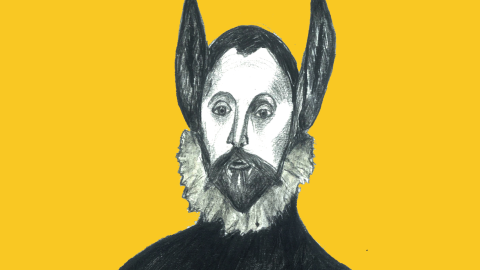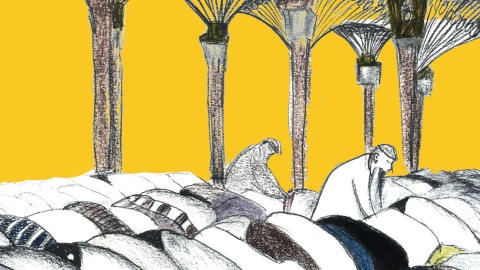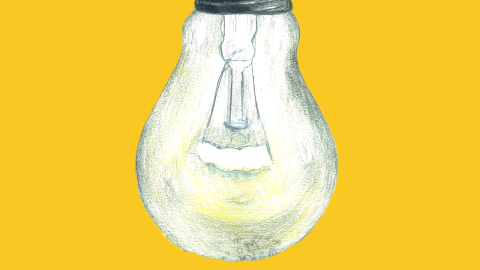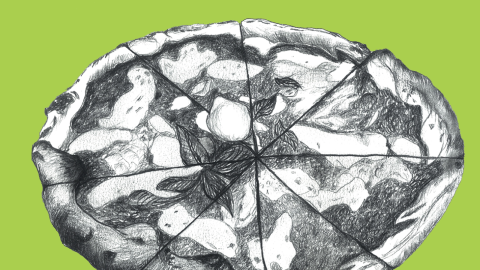“Mathematics is the language through which God has written the universe”
“The purpose of mathematics is not to make simple things complicated, but to make complicated things simple”
Alexander Grothendieck, “the Einstein of mathematics”
But what did this undisputed genius really do to make things simple? When he died, here is what was written by his colleagues in his obituary:
Although mathematics became more and more abstract and general throughout the 20th century, it was Alexander Grothendieck who was the greatest master of this trend. His unique skill was to eliminate all unnecessary hypotheses and burrow into an area so deeply that its inner patterns on the most abstract level revealed themselves–and then, like a magician, show how the solution of old problems fell out in straightforward ways now that their real nature had been revealed.
Many other mathematicians tried to be the first to scale Everest, even if it needed new climbing techniques and a difficult and complicated route. But Grothendieck stayed away, trying to invent the airplane, from which he could simply parachute onto any mountain, or survey the whole world.
No one understood structure like Alexander. And he had this trademark approach to his work – add more abstract layers and change perspective until we can see the true nature of a structure.
The human brain hates complexity as it’s confusing. Humans evolved solving mostly simple problems and not having to delve into abstract thought was an advantage. But the world has changed and there are cases when it’s better to temporarily resist out nature. Finding a good foundation for a self-help philosophy is one of those cases.
Although it’s our natural instinct, it doesn’t help when we try to make a complicated problem simple by just ignoring parts of it. Because what we ignore may be of critical importance. It’s only when we understand the full picture, when we immerse ourselves in the full richness of complexity and we understand it, that we change perspective, see the actual patterns… and then simplicity follows. Then and only then we know what we can safely ignore.
The true underlying structure may be complex but once we understand it and find out the right tools to work with it, we finally reach simplicity. We finally know what to do.
Can we apply the same approach to Self-help? How deep do we have to go to find out why the hell the book or podcast advice didn’t work for me? Maybe it’s my fault?
Don’t ever think it’s you. You may need more time, more space, more support or a better book or podcast. Doubting yourself will not lead to any progress.
Ready for the deep dive?
If self-help quality was a mathematical function, what could we optimize?
Any piece of self-help advice has the following variables:
- A: What are the chances that the advice is understood, intuitively if possible? (simplicity)
- B: What are the chances that the advice is followed, if understood? (motivation/resistance)
- C: How much short term benefit does it bring when followed? (can be negative)
- D: What is the long term value? (we measure D in Long Term Freedom won; can be negative)
- E: What are the odds that any progress reverts back to where we were?
The Quality of the advice Q is more or less Q = A x B x (C+D) / E
Most bad self-help advice is bad because it underestimates the power of D (the impacts on Long Term Freedom) which, like most time-related concepts, is intuitively hard.
But bad self-help in books and podcasts is not so common. The quality of the suggestion itself (C and D), not its form, of most advice you’ll read or watch on Youtube is decent.
The usual story is we read/listen, it sounds right (A) and then we just… don’t do it (B) or we do it for a short time and then we’re back at square one (E).
Why don’t podcasts and books mostly work in regard to B and E? Why does it feel hard to make progress and easy to lose it? Of course there is inertia, but if you’re already listening to a self-help podcast or reading a book, you already made a dent in the background of inertia, you should be half way there. Why doesn’t it work?
We think the problems with B and E really start with A, which seems the easiest, after all we have a language, we use words, they have a meaning, we understand. Right? Right.
But it turns out it’s not enough to read words or hear a voice. It has to resonate with you. You have to feel it deeply so it can become part of your intuition. It’s one thing to read you need Self-Love (A), and a completely different thing to start feeling you need it and understand you don’t have to deserve it (still part of the hidden A spectrum)… then and only then you can start practicing it (B) for life (E).
A is really a spectrum. Most books and podcasts get it kind of right but there is much more to optimize, more to improve. And it changes everything. Because if A is only average, B and E are not likely to be in your favor.
Why we need better language in popular self-help literature
Just like chemistry is really just physics, described in a much more convenient language (you don’t need to calculate the wave function of each electron in an atom to work with valency), we must accept that our current words are not the best to intuitively describe what lacks most in self-help (A, B and E). There are many concepts in I Grow Younger that we have to define first because despite their huge importance, there are no words for them in our language.
If we feel stuck in self-understanding, self-growth and motivation, we need simpler principles to build our intuition on (A). But what is simple and also as close to the truth as possible? I asked myself this question before I Grow Younger was founded, before a single word was written. I came up with two core concepts I started with and a few more were added along the way because they popped up constantly, no matter what I was writing about.
The newly defined concepts helped us rearrange the core building blocks of life so they can be easily understood in deep (A) and influenced in a practical way (B) that feels good and thus sticks (E).
The resulting model is broad and intuitive (so it can be applied differently by different people) and very interconnected, just like reality in life. But it’s not complex, in fact the building blocks are dead simple. Relations in it can be understood by a child if only it hasn’t already copied too many extra concepts that are not essential for this model and that cloud the perception of what really matters.
Getting rid of the many wrong and/or useless micromodels copied from family, friends and society to make the big space needed for a big unified new model based on science is a monumental task. But I also have good news for you. You only have to do it once.
Since what we suggest is the reversal of your antigrowth in order to grow, we called our self-help system “I Grow Younger“.
It is growth-focused and the elements may seem a weird choice until you see how much it prioritizes progress actually happening (B) and how it all unfolds in time (D, E). Analyzing life events like frozen snapshots is harmful simplifying. Reality is a flow in time and we needed a new structure and new terms (A) to find simple principles in the complexity.
The new concepts we need for proper self-help
The next 30 lines are what will hopefully change your life. It’s I Grow Younger’s structure which can make your self-growth process much more understandable and doable. Ready, set, go!
The least innovative thing we do is to separate the processes in your head and everything in the real world into two categories and never mix them up. We call them The Game of Self and The Game of Life. This totally-not-new principle is all over popular books and videos and helps approach each of the two accordingly. What is often missing is its application in areas like Money or Love or the Hidden fear of being a bad person. But from here on we start being unconventional.
We ask where do humans suck the most? Change and fighting Inertia. When is self-initiated change possible? Only when we have the freedom to consider it, the environment to stimulate it and the drive to relentlessly pursue it against our inertial nature.
This one sentence is likely describing your control (or lack of it) over your life more accurately than any other you have ever read. And acting on it will require clicking a lot of links above and below, reading the articles and building a largely new concept for your life. But it’s not complicated. As Grothendieck would have said, the hard part is already done. The new layer of knowledge is constructed. Once we explore it, the problems will seem more like easy opportunities for growth, barriers for Self-Love will gradually disappear and you’ll be able to feel better… and help others too.
Just. One. More. Concept. Time.
The simple Self-help principles in long, mid and short term.
We make Long Term Freedom our success-measuring stick for growth so we have something to strive for even if we don’t feel we have found a specific life purpose. This way we keep all doors with good things behind them open. This is our long term vision (years) and our Why if we haven’t found a better one. If helps us make the big choices.
We shape our environment with our choices. When they are Freedom-expanding ones like good Education, being an Entrepreneur, improving Time Management and understanding Structure, Balance and Numbers, we build the best environment for happiness and success. This is our mid-term vision (months and days) and our What. It helps us set the best stage for Hunter mode.
We prioritize our drive (which we call “Hunter mode“) as our main tool in increasing our chances for growth in all of this. If every tiny next action is a “Hunter move”, we overcome inertia, gain more experience in a short time, resulting in deeper intuition and creative and financial freedom with which we can achieve anything in life. This should direct in the very short term (seconds, minutes and hours) our tiny choices and is our How.
These simple principles literally helped me change my life with no extra effort (I’m bad at efforts and you’re probably bad too, it’s better when thing happen naturally) and every single one of them has had a massive impact. I’m passing the torch to you.
It’s time for you to rock it 🙂 And don’t keep it to yourself, share with others and help them too. Change lives!




























